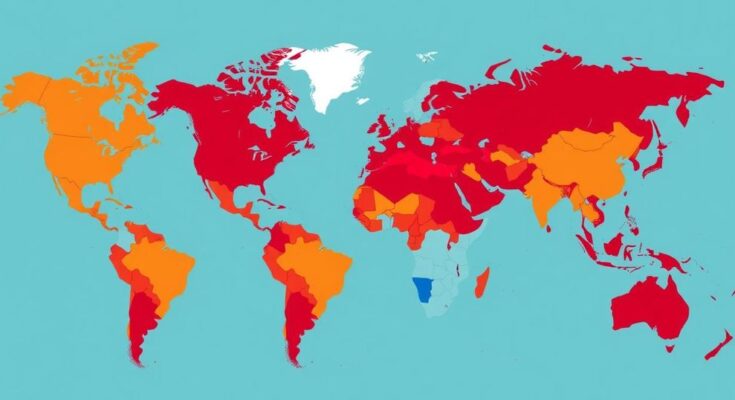The U.S. Department of State has issued Level 4 “Do Not Travel” advisories for various countries, including Afghanistan, Venezuela, and Iraq, due to escalating safety concerns. The advisories highlight risks from crime, political instability, and terrorism, affecting American tourists’ perceptions and travel plans during the upcoming spring break season. Travelers are encouraged to follow safety protocols and stay informed to ensure their security.
The U.S. Department of State has upgraded travel advisories for several popular spring break destinations, which now include Russia, Jamaica, Colombia, and others. The advisories, ranging from Level 3 (Reconsider Travel) to Level 4 (Do Not Travel), have been motivated by rising crime rates, political turmoil, and gang violence. This shift signals significant safety concerns as the spring travel season approaches, affecting perceptions of these traditionally appealing destinations.
Historically, these countries have drawn millions of American tourists seeking cultural experiences and picturesque environments; however, recent warnings point to escalating security crises posing risks to both citizens and travelers. The U.S. government highlights increasing violent crime, such as armed robberies and kidnappings, urging American citizens to heed these advisories.
The Level 4 advisory is the most severe warning issued when risks such as ongoing conflicts or severe political instability threaten safety. As of February 2025, various regions, including Afghanistan, Venezuela, and Iraq, are listed under this advisory due to an alarming increase in safety issues. This reflects the U.S. government’s concern for its travelers, urging them to reconsider their travel plans.
Afghanistan remains exceptionally dangerous owing to a resurgence in Taliban activity, leading to rampant violence and kidnappings. With limited healthcare services, the U.S. government advises against all travel to this area. The Democratic Republic of the Congo (DRC) is similarly unsafe, battling armed militias and civil unrest while being prone to health crises such as Ebola.
Lebanon’s ongoing political strife coupled with economic instability has resulted in a Level 4 advisory recommendation against travel. The Central African Republic faces brutal armed conflicts and lacks adequate healthcare resources, prompting strong discouragement from the U.S. government regarding travel there.
Belarus has seen years of political repression, putting American travelers at risk of harassment and detainment. Iraq continues to experience threats from ISIS and armed groups, leading to a sustained Level 4 advisory. Meanwhile, Ukraine is also under significant threat due to the ongoing Russian invasion, eliciting an urgent travel alert for Americans.
In Venezuela, severe political and economic instability has resulted in hyperinflation, civil unrest, and dangerous crime levels. Similarly, Haiti struggles with rampant gang violence, while Iran’s political instability presents risks for foreigners.
While many of these nations pose severe risks, travelers must consider the consequences of ignoring U.S. travel advisories. Safety protocols, including keeping updated with advisories, enrolling in the Smart Traveler Enrollment Program (STEP), and obtaining travel insurance, are essential.
The impact of these advisories on the travel industry is being felt acutely, as tour operators and agencies adapt by reassessing their offerings amid safety concerns. Potential outcomes may include increased demand for travel insurance and cautious planning by travelers.
Despite some tourists remaining unaware, the U.S. government continues to promote informed decision-making. The travel advisory system assesses destinations based on crime rates, governance, and emergency services availability. As spring break approaches, it is imperative for travelers to heed these warnings and prioritize their safety in planning trips to these high-risk locations.
In conclusion, the updated travel advisories emphasize the significant risks facing travelers during the upcoming spring break season. With an increasing number of regions deemed unsafe, the travel industry must adjust to shifting safety concerns. American tourists are encouraged to remain well-informed, monitor their safety, and plan their travels judiciously to ensure a secure and enjoyable experience.
The recent U.S. travel advisories underscore the importance of traveler awareness and safety amidst rising risks in several popular destinations. As regions face increased conflict, political instability, and crime, American travelers are urged to consider their travel decisions carefully. The travel industry will likely respond to these advisories, highlighting the need for vigilance. Ultimately, informed planning and prudent decision-making will enhance traveler safety this spring break season.
Original Source: www.travelandtourworld.com




